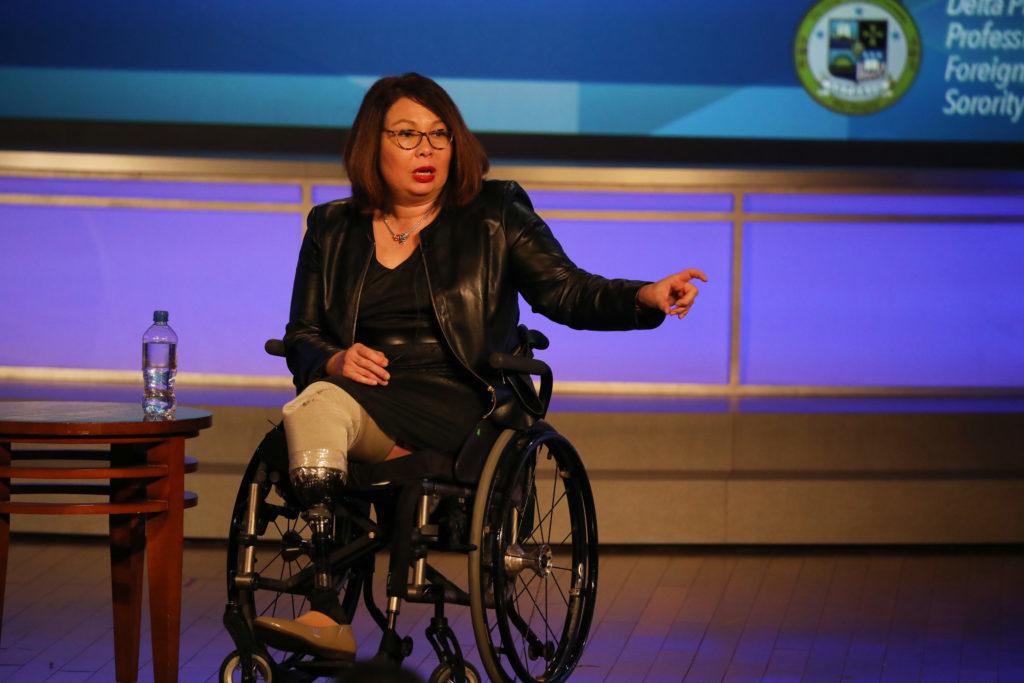Updated: Oct. 20, 2019 at 12:51 p.m.
A senator and alumna spoke about U.S. foreign policy and her career at the Jack Morton Auditorium Wednesday.
U.S. Sen. Tammy Duckworth, D-Ill. and a Purple Heart recipient, discussed public service at an event hosted by professional foreign service sorority Delta Phi Epsilon and co-sponsored by the Elliott School of International Affairs’ Leadership, Ethics and Practice Initiative and Alumni Programs. Duckworth, who received her master’s degree from the Elliott School in 1992, gave the speech to commemorate Global Ethics Day, a LEAP event.
Duckworth, who delivered GW’s Commencement address in 2017, said she reconciles her constituents’ “kitchen-table” domestic interests with international policies to make the greatest impact she can. She added that she builds consensus on issues like climate change with her Republican constituents and colleagues by framing issues in terms of their real-life impacts, like farmland or military bases harmed by flooding.
“Right now, it is likely that over 100 U.S. military bases will be flooded due to rising sea waters, so I talk to my colleagues and say if you want a strong military, we need to re-enter the Paris Accord,” she said.
She said Trump’s recent foreign policy decisions, like his decision to withdraw all U.S. troops from Syria, has brought the United States’ standing around the world “lower” than she thought possible. Duckworth said Trump’s actions may make diplomacy more difficult but added that his actions, while a “bad tactical decision,” were not unethical.
Hours before Duckworth’s speech, a bipartisan majority in the House of Representatives voted to condemn Trump’s actions in Syria. Duckworth added that she hopes more senators will publicly condemn his actions.
“He has basically abandoned our Kurdish allies to be slaughtered,” she said. “We’re talking about a force of people who have fought alongside U.S. troops shoulder to shoulder with us, who have been the main people on frontlines against the Islamic State.”
She said that an alternative “main strategy” U.S. policymakers should adopt is to work with allies to build up failing nations and avoid sending U.S. troops to die on foreign soil. She cited her experience growing up in Southeast Asia, where “everyone loved America” after the Vietnam War, as a successful case of American foreign policy.
“People didn’t respect us because we just lost the Vietnam War,” she said. “They respected us for everything else we stood for.”
Duckworth said that when she entered public service, she experienced imposter syndrome as a woman, often feeling like an inadequate “broken-down helicopter pilot.” But Duckworth, a double amputee who served in the U.S. Army during the Iraq War, said women should not shy away from public service because of their fear of failure.
“I got to the point where I needed to serve my country,” she said. “It was my new mission.”
Duckworth said she hopes to raise the prestige of national service because the United States will be a “stronger nation” if more people begin to serve their communities. She added that she is working on a bill to extend free college education to non-military national service, which she hopes will boost involvement in public service.
“What’s the point of having F-35 fighter jets if you actually can’t find the people to fly them?” Duckworth said.





